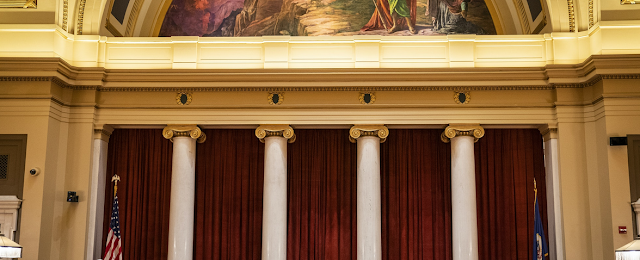Thursday, September 16, 2021
PMT: MN and Clemency
Yesterday morning, I drove over to St. Paul (it's not too far) to hear the arguments in an unusual case before the state Supreme Court.
I had a special interest in the case. Several years ago, someone in my clinic asked why we didn't work on state clemencies. It was a good question- one reason was because I didn't know how clemency worked in the state, so I endeavored to find out. When I dug into it, I found a very strange process-- stranger than the federal system's. In Minnesota, clemency petitioners argue their case in person, usually without an attorney, directly to a Pardon Board that consists of the Governor, the Attorney General, and the Chief Justice of the Supreme Court. It is fantastically unproductive; states like South Dakota, South Carolina, and Alabama regularly grant far more pardons that we do, even when adjusted for our lower rate of crime and incarceration.
The scheme also seemed to violate the state constitution, which allows that the "Governor, in conjunction with the Board of Pardons," has the power to grant clemency. An old statute hobbled that construct by requiring unanimity on the board to grant a petition. Over and over, I saw good cases shot down by a 2-1 vote.
So, I tried to fix it. I met with the Governor's counsel. I took a great reporter to the hearings with me, so she could write about it. I drafted proposed legislation. I wrote a piece in the Star Tribune in October of 2019, arguing that the current set-up was dramatic but unconstitutional.
None of it worked. The legislature is almost immobilized by division, unfortunately, and almost never takes up substantive criminal justice reforms.
So... last year, the right case came up for a court challenge. Amreya Shefa is an Ethiopian immigrant who was in a terrible marriage. She was threatened by her husband with a knife, and was able to defend herself, killing him. She ended up (somehow) being convicted of manslaughter and sentenced to five years. As her term ended she sought clemency to avoid being deported to Ethiopia, where she feared (with good reason) that her husband's family would kill her.
Her petition failed on a 2-1 vote, with the Governor and AG voting for a grant, and the Chief Justice voting against. We got some excellent law firms to take up the case and challenge the constitutionality of the unanimity rule on behalf of Ms. Shefa. We won in the District Court, and the case was expedited to the State Supreme Court, where the Chief Justice recused herself since she is a party. The Governor switched sides, so it was the Governor and Shefa on the side of striking down the unanimity requirement, and the AG and Chief Justice on the other. As one might expect, it was a tense and fascinating morning in court!
You can read about the arguments here. I suspect an order will come first, and then an opinion-- let's all hope for the best!
Comments:
<< Home
Wow. Good work! That process sounds crazy, and impossible. I'm stuck at the part where the person has to plead their case (esp. without a lawyer) before arguably the three most powerful people in the state: the Governor, the Attorney General, and the Chief Justice of the Supreme Court. Who wouldn't be quaking at that.
Post a Comment
<< Home



